Small Business Website: How to Create One?
Having your own website isn't just essential for big companies. Where else will customers learn about your products and services? While large companies have a good budget for a professional website and may even have their own web team, small businesses usually need to work with less.
But even small businesses can now create their own online presence easily and affordably. Read this article to learn how to do it and what you need to keep in mind.
Why Does My Business Need a Website?
If your business is doing well without a website - or if you're just starting your business - you might wonder why you need one at all. Here are several good reasons:
Customers expect it
Studies show that 70-80% of people research small businesses online before visiting or buying from them. Without a website, these potential customers might find what they're looking for at your competitors.You can present your business exactly how you want
You might think a website isn't necessary because you're already on Facebook, LinkedIn, or Instagram. But while social media is controlled by public opinion, your website is completely under your control. Here, you can show your business in its best light.You can attract new customers and grow your reach
With your own website, you can appear in Google and other search results. This helps potential customers find you who might never have heard of your business otherwise. You can expand your business's reach - maybe even internationally.You're available 24/7
Online, there are no business hours. Your website is open 24 hours a day, and if you answer all important questions right there, you'll not only impress your customers but also reduce the load on your customer service.You can compete with bigger - and other small - brands
Many customers prefer shopping at smaller and local businesses instead of always supporting big brands and chains. However, these bigger companies are more visible online and offer certain conveniences.
With a good website, you can be found more easily as a local business in your area (since search engines like Google consider these factors) and compete with bigger brands.Creating your own website is now easy and affordable
And one of the best arguments for having a website is: what's stopping you? It's now so easy and affordable to create a professional website that there's really no reason not to have one.
How Do I Create a Website for My Business?
If you need a website, you have 3 main options: you can code it yourself, have experts create it, or use tools like content management systems (CMS) or website builders.
If you have the coding and web design skills to create a website yourself, you've probably stopped reading by now - and started programming. For everyone else, there are three options:
Have a Website Created for You
If you don't know how to code but have enough budget and a clear vision for your website, you can put its creation in the hands of professionals. Here are your main options:
Agencies: Agencies handle the planning, design, and launch of your website, offering many different services under one roof. However, because they involve multiple professionals and have higher operating costs, agencies tend to be quite expensive.
Freelancers: Freelancers usually cost less than agencies since you're working with just one person on your website project. This makes it extra important to find the right freelancer and clearly communicate your needs and expectations.
How to Find Agencies and Freelancers
There are many online platforms where you can hire freelancers and agencies for your website project. Some of the most popular ones are Upwork, Freelance.de, and Fiver.
On these platforms, you can narrow down your search using keywords like "small business website" and filter results by cost or other factors. Payment happens directly through the platform, which takes a commission (usually included in the listed price).
You can also find freelancers through a simple Google search. Look specifically for agencies and freelancers who have experience with small business websites. You can also limit your search to specific areas if you want to work with someone local.
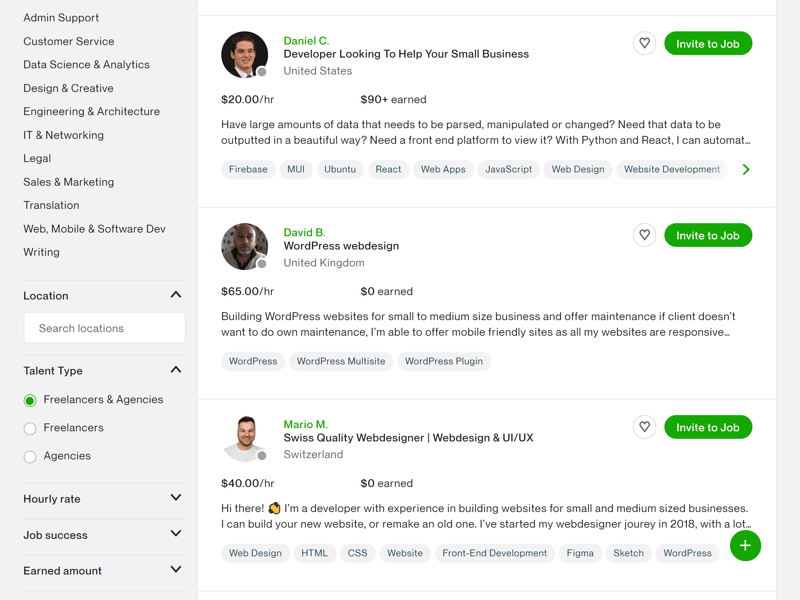
On freelance platforms like Upwork, you can search specifically for freelancers who have experience creating small business websites.
How Much Do Agencies and Freelancers Cost?
Costs range from $1,000 to $20,000 depending on the freelancer or agency - and can go even higher. Don't be too stingy with your budget if you want a high-quality website, since it's a long-term investment in your company's future.
While you'll find many surprisingly low-priced offers on platforms like Upwork, cost shouldn't be your only deciding factor.
First, the quality, commitment, and availability of the freelancer might be lower. Second, the cheapest offers often come from freelancers in countries with a lower cost of living. Outsourcing important work at discount prices could harm your company's reputation if it becomes public.
Hiring Someone to Build Your Website: Pros and Cons
100% flexible: With professionals by your side and enough budget, there are basically no limits: You can have your website designed exactly how you want it.
Many options: There are plenty of freelancers and agencies to choose from. You can find the right offer for your needs and budget.
Professional support: You hand over your website project to experts and always have someone to contact for questions, requests, and feedback.
High costs: Good web designers and developers know their skills are in demand and can charge accordingly. Unless you go for one of the cheap offers (which you should always view with caution), you'll need to budget for higher costs.
No quality guarantee: Not every freelancer or agency delivers the results you want. It can also be hard to explain exactly what you're looking for. You might end up paying a lot and still not be completely happy with the result.
Building Your Own Website: CMS or Website Builder
You can also build your small business website yourself. If you don't have programming and web design skills, there are mainly two options: content management systems (CMS) and website builders.
Content Management Systems: Pros and Cons
Content management systems are platforms that let you easily manage and publish your website content - like text, images, videos, and more. You don't need programming skills because you can use design templates and visual editors.
The most popular and widely used CMS is WordPress. It offers a huge selection of free and paid themes and plugins that let you create almost any type of website.
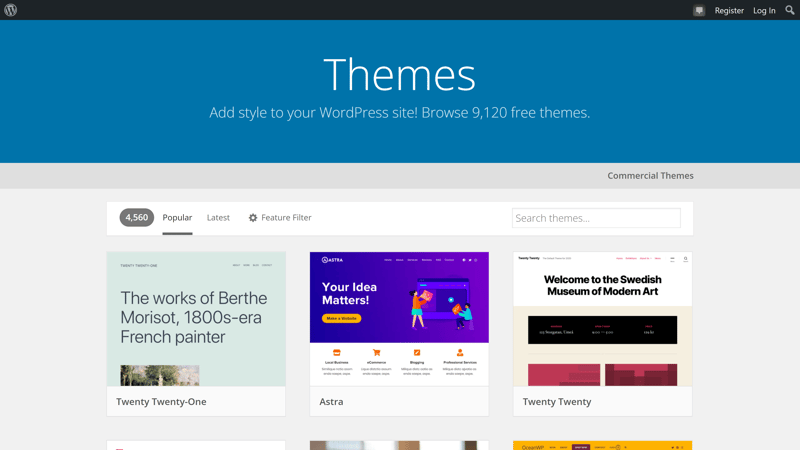
WordPress offers an endless variety of themes and plugins.
Like other CMS platforms, WordPress is open-source and free to use. However, you need to take care of your own web hosting and domain, and install WordPress on your web space.
Here are the main pros and cons of CMS:
High flexibility: CMS platforms like WordPress offer almost unlimited design options. You can customize and expand your website's design and features however you want.
Lots of plugins: You can add thousands of plugins to your website that cover any feature you might need.
Full control: You have complete control over your website and data – unlike with website builders, you're not tied to a single company.
Scalability: A CMS can grow with your business. You can easily add new pages or features to your website.
Technical know-how: Setting up and managing a CMS needs some technical skills. You'll need to handle hosting, security updates, backups, and speed optimization yourself – things that come included with website builders.
Extra costs: While using a CMS is free, you'll need to pay for hosting, domain, premium themes, and plugins.
Website Builders: Pros and Cons
Website builders are user-friendly online platforms that let anyone create their own website. They come with easy-to-use no-code editors and templates, where you can visually place and edit pre-made content blocks and elements.
While website builders work similarly to CMS platforms, they're not nearly as flexible. They're closed systems that don't let you control many technical details. You can only use the features and settings the builder provides.
However, website builders are much more beginner-friendly. They offer all the resources and features you need to run a website in one package and handle all the technical stuff for you.
And even though they're more limited than CMS platforms like WordPress, some website builders strike a good balance between design flexibility and ease of use – and there are even some advanced builders that give you almost complete creative freedom.
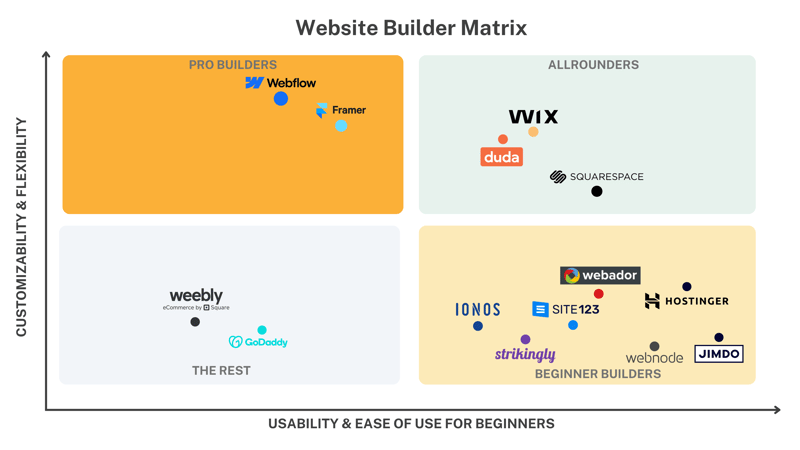
Different types of website builders offer varying levels of features and ease of use.
Here are the main pros and cons of website builders:
Affordable package pricing: The monthly costs of a website builder should be manageable even for small businesses. The cheapest website builders start at less than $10 per month – though you'll need to spend a bit more for professional business websites.
Ease of use: You don't need any design or coding skills. Even complete beginners can create a website using website builders.
All-in-one package: Your website builder takes care of everything: web hosting, domain, security certificates and more - all from one provider, so you don't have to worry about anything else.
Limited flexibility: You can't bring every idea to life exactly as you want, since you're limited to the features and design options of your website builder. This restricts how much you can customize your site.
Technical drawbacks: Website builder sites can sometimes lag behind when it comes to things like loading speed or search engine optimization.
Generic results: Unless you have advanced web design skills, it can be hard to break away from the website builder templates. This means your small business website might end up looking very similar to many others in your field.
Top 3 Website Builders for Small Businesses
We have carefully reviewed 15 website builders on EXPERTE.com. Here's our top 3 for small businesses:
Wix Website Builder: The EXPERTE.com Winner

Our review winner Wix is, in our opinion, the best all-around option on the market. The platform combines a huge range of features, user-friendly operation, and extensive design options into an "excellent" overall package that works great for small business websites.
Testimonials, contact forms, and more: Wix has ready-made elements for pretty much everything you need on your business website. It also shines when it comes to blogging, ecommerce, and marketing features.
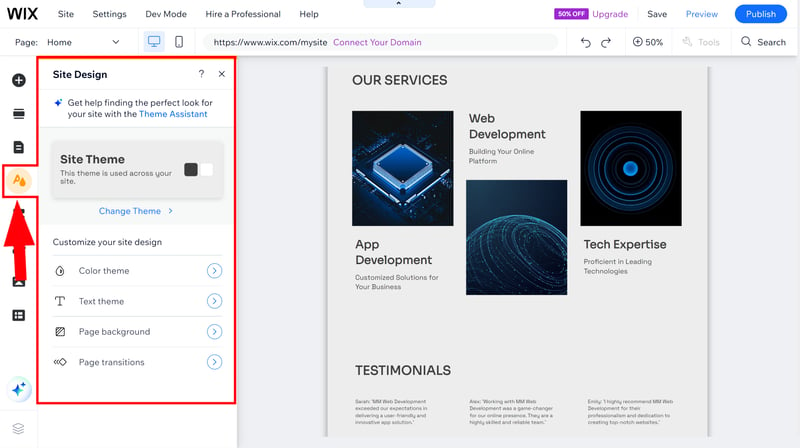
EXPERTE.com review winner Wix is worth checking out for small businesses.
If the included features aren't enough for you, check out the Wix App Market where you'll find lots of add-ons.
Compared to other website builders - especially in the beginner-friendly category - Wix is more complex and has a steeper learning curve for newcomers. The editor can also feel sluggish at times and sometimes has performance issues because there's so much going on.
To learn exactly how to create your website, check out our step-by-step guide for Wix.
800+ design templates
user-friendly editor with free drag-and-drop
many features and content elements
more complex than other website builders
editor can be slow and heavy
Squarespace Website Builder: Stylish Designs for Small Businesses

With Squarespace, you have less design freedom compared to Wix. But the templates make up for it - Squarespace is known for its elegant and stylish designs that help you create a visually appealing business website.
In Squarespace, you add new content blocks as "sections." You'll find all the important elements like contact forms, FAQ areas, or team sections, plus industry-specific features like tour dates or reservations.
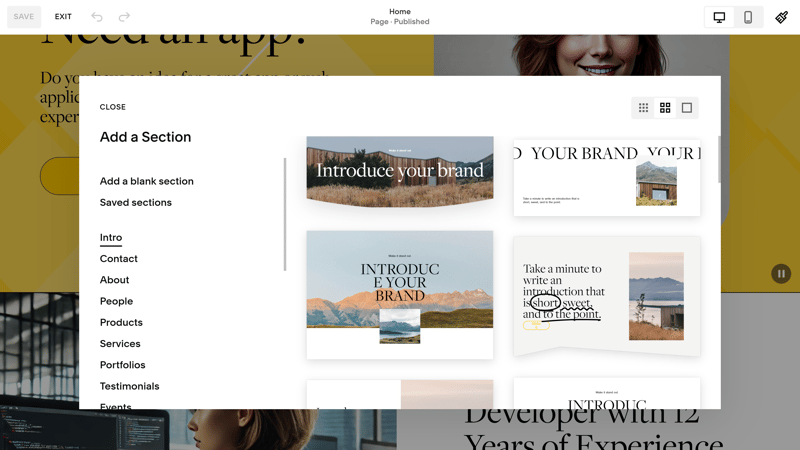
You can customize your Squarespace website with pre-made sections.
Squarespace only offers multilingual websites with a paid plan or through a clunky workaround. If your small business targets an international audience, other website builders might be a better fit. The platform's support is also slow and unreliable.
150+ attractive templates
wide selection of section templates
easy to use
powerful ecommerce features
no free plan
paid multilingual features
fewer design options than Wix
poor support
Strikingly Website Builder: A Beginner-Friendly Alternative

Do you find all-in-one platforms like Wix or Squarespace too complex for your needs? You might want to try a beginner-friendly alternative: Quick-start website builders like Strikingly limit your design options but are much easier to use.
Instead of customizing each element of your website individually, Strikingly keeps things simple: You build your pages mainly using pre-made section templates with limited layout customization options.
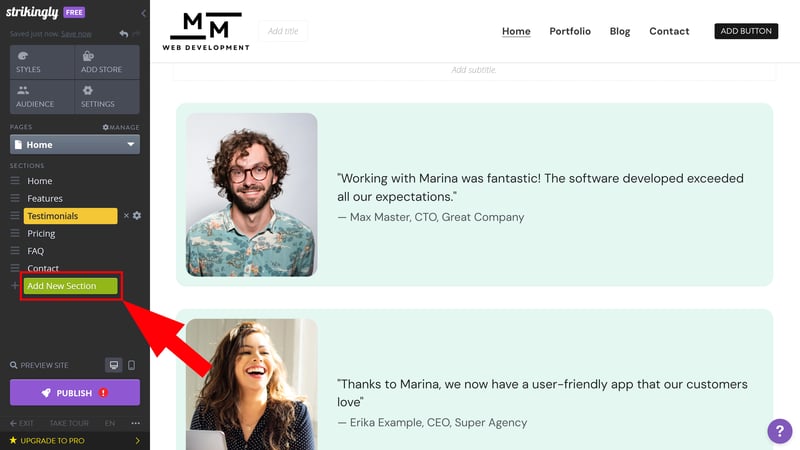
At least they offer a wide selection of website templates and a solid range of section layouts. Another plus is their support with live chat, which in our experience responds quickly to questions.
If you want to create a working and decent-looking website quickly and easily, Strikingly is worth checking out.
180+ templates
suitable for complete beginners
fast chat support
limited design freedom
fewer elements and templates
editor can be clunky at times
What Elements Should Small Businesses Include on Their Website?
While you can design your website however you like, make sure to include these essential elements:
Eye-Catching Homepage
Your homepage is where visitors land first - it's your business's storefront. Here, you need to quickly show potential customers what industry you're in, what products and/or services you offer, and what makes you stand out from your competitors.

Your homepage should wow your visitors.
This is where you should avoid stock photos and meaningless phrases. Present yourself or your company with high-quality images and pay special attention to the marketing and informational content on this page.
Readers want to get to know your company, but most importantly, they want to know what's in it for them. Design your homepage by looking at it through your potential customers' eyes and clearly communicate what makes your company unique.
Intuitive Navigation
You want visitors to quickly find what they're looking for on your website. This requires an intuitive navigation menu that makes all pages and subpages of your website easy to find.
Most website builders make it easy to create a navigation menu and automatically add new pages. Make sure not to cram too many menu items into the navigation or hide important information in subpages.

Help your website visitors quickly find what they're looking for with a good navigation menu.
Services
What exactly can customers buy from you – and how much does it cost? Help visitors choose by clearly presenting your different products or services.
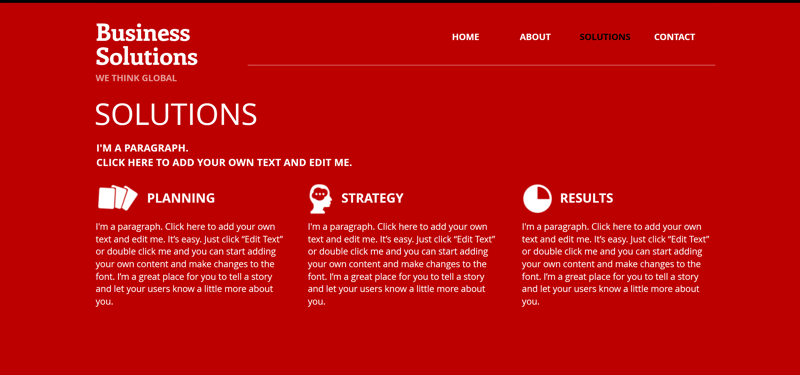
What does your company actually do?
About Us Page
Your homepage should get straight to the point - long paragraphs about your company's history or philosophy don't belong here. However, you can share detailed information about your company, team, and everything related on your "About Us" page.
People who land on this page want to learn more about you and your company. Be honest, transparent, and friendly to make a great impression.
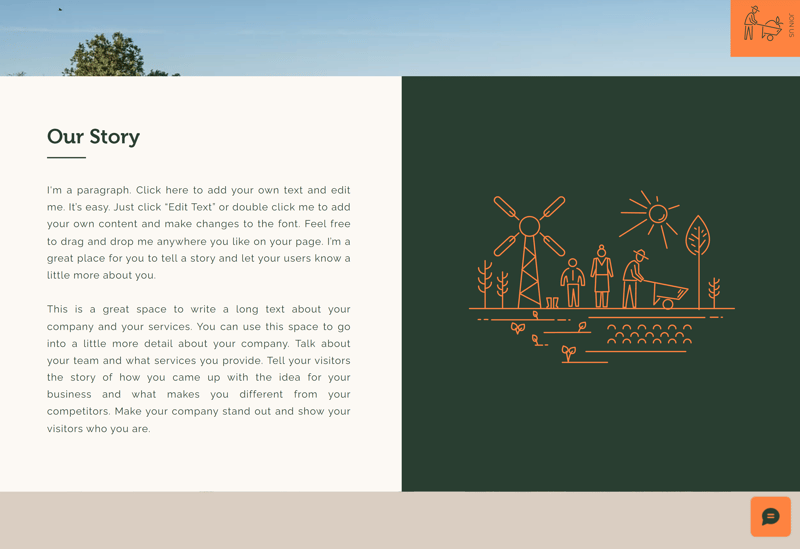
You can introduce your company and mission in detail on your "About Us" page.
Contact Options
Let your website visitors know how they can reach you. Website builders offer ready-made contact pages where you just need to add your information. You can usually customize the contact forms to fit your needs.
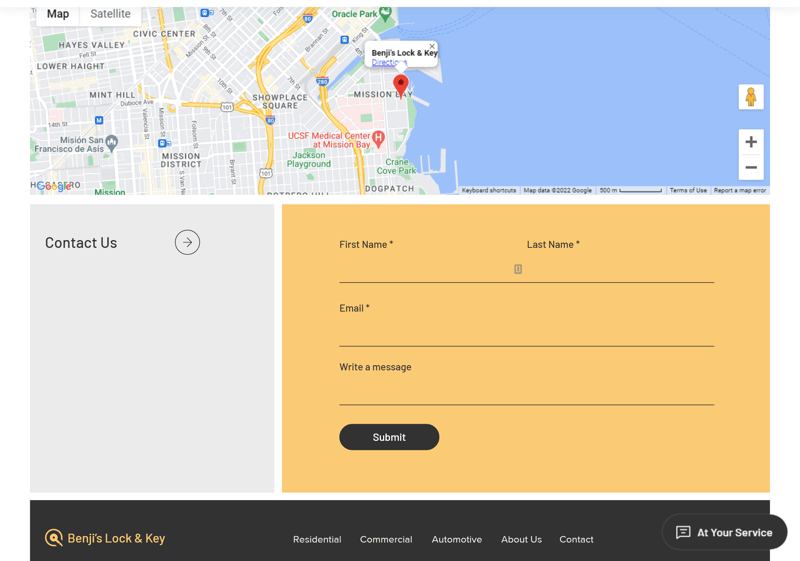
Make sure your contact page is easy to find on your website.
Customer References
Testimonials and references from past customers and projects are key resources for potential clients. Here you can showcase your previous work and highlight the areas where you have solid experience.
Remember to get your customers' permission before using their quotes or references.
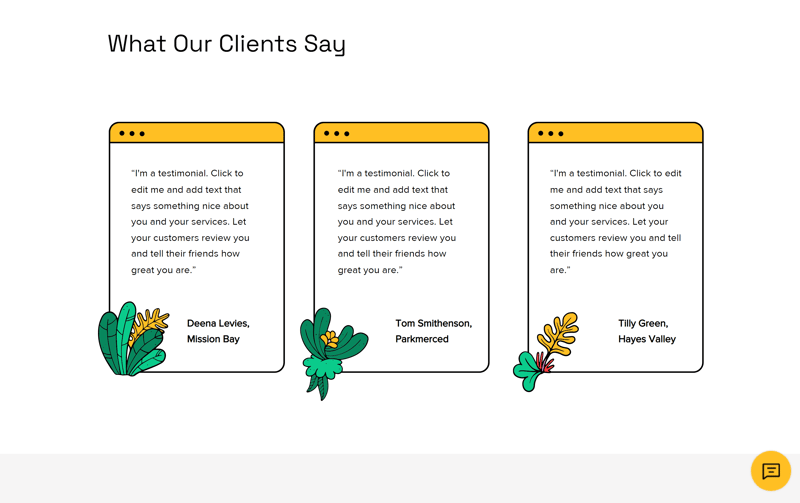
Your references and testimonials are important factors when potential customers make their decision.
Legal Notice & Privacy Policy
There are some legally required elements you need on your website - most importantly the legal notice and privacy policy.
In Germany, a legal notice is required by law: As a business, you must provide an easily accessible legal notice on your website. This should include your company name, owner details, address, and contact information (phone number and email address). The specific requirements may vary depending on your type of business or industry.
Many website builders offer templates for your legal notice. You can also find online tools that help you create one, like the Legal Notice Generator from Shopify.
Under GDPR, a privacy policy is also required. You need to explain how you handle visitor data on your website. You can have a lawyer create your privacy policy, or you can use templates available online, like those from fuer-gruender.de.
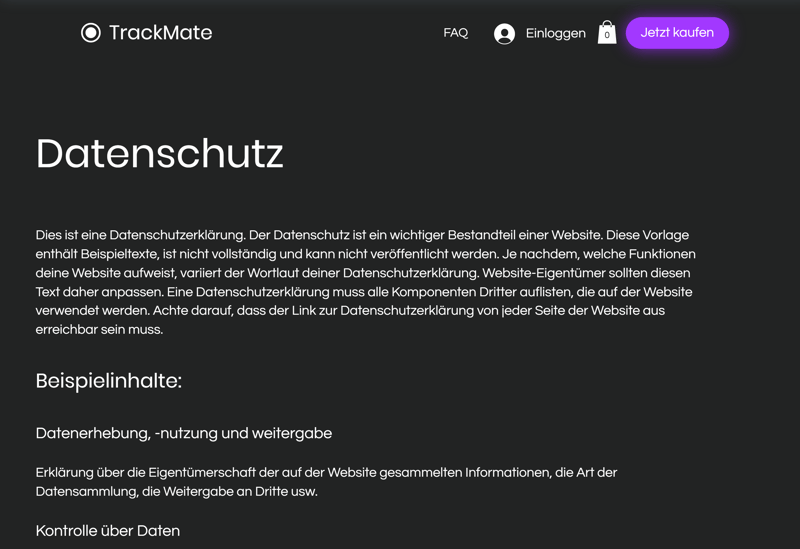
A legal notice and privacy policy are required on your website.
How to Create an Online Store and Start Selling
Want to sell products on your website? Most website builders let you do this, but their ecommerce plans usually cost more.
For businesses focused on ecommerce, there are dedicated platforms like Shopify: Besides standard website builder features, these platforms offer detailed dashboards for managing your products and settings for payment and shipping.
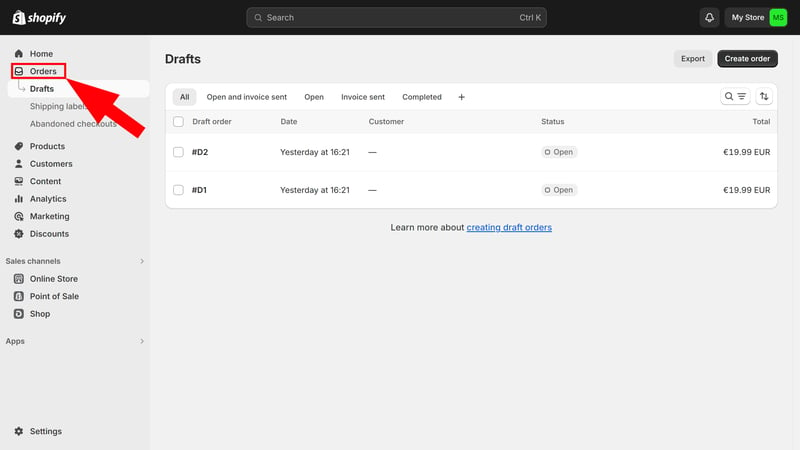
Online store platforms like Shopify bring the website builder concept to ecommerce sites.
To learn how to create an online store and which website builders are suitable, check out our ecommerce guide on EXPERTE.com.
Summary
Today, even small businesses need their own website. If you can't code yourself, you can either hire agencies or freelancers to build your website, or create it yourself using a content management system (CMS) or website builder.
A CMS like WordPress offers maximum flexibility but is harder to use since you need to handle technical aspects yourself. Website builders are cheaper and suitable for beginners with no technical knowledge. However, your site's look and scope will depend on the builder's features and options.
The best providers for small businesses include Wix, Squarespace and Strikingly. Our detailed reviews of 15 website builders and 9 ecommerce platforms will help you make your choice.
Common Questions & Answers
You can code your website yourself, hire experts like freelancers or agencies to build it, or create it yourself using website builders. Website builders are relatively affordable and easy to use even for beginners with no coding skills, but they have some limitations regarding design and features. The best website builders include Wix, Squarespace and MyWebsite by IONOS. Having freelancers and agencies build your site costs more but offers more flexibility than website builders.
If you hire an agency or freelancer to build your website, costs range from $1,000 to $20,000, depending on the provider and your website's scope. A website builder costs about $10 per month, with plans that include extra features (like ecommerce) costing more.
Your business website should include an informative homepage, clear navigation menu, overview of your services, contact page, and customer testimonials. You also need to include legal information and a privacy policy page.











